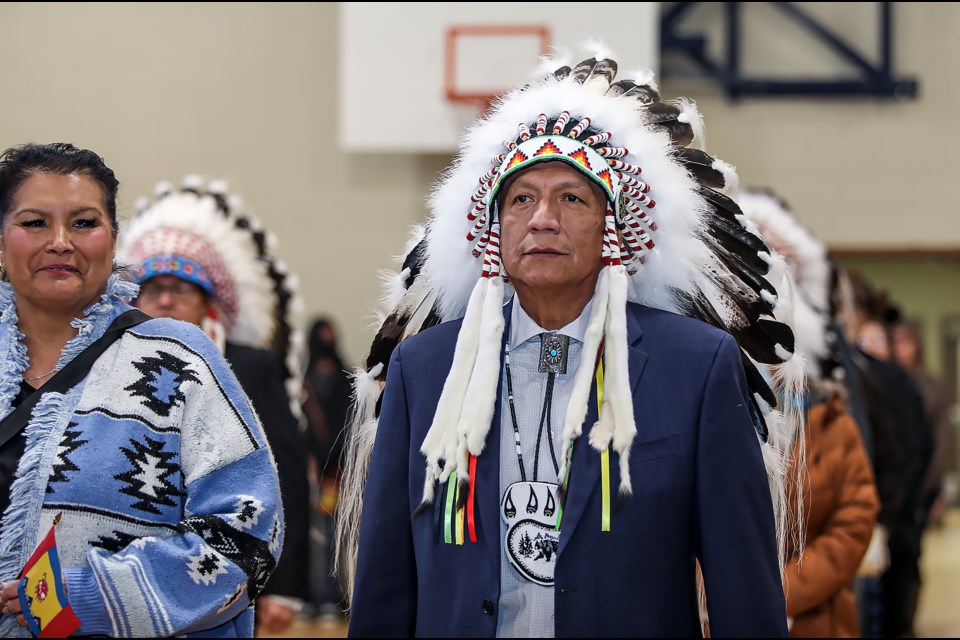ÎYÂRHE NAKODA – Bearspaw First Nation has taken the federal government to court after it took officials nearly four months to sign off on a trust money transfer, losing out on investment opportunities for the band.
The lawsuit claims the Nation lost $5 million between May 26, 2021, when the transfer was to be made, to Aug. 17, 2021, when a ministerial order was eventually signed.
“It was held back and we had to take Canada to court over it,” said Bearspaw Chief Darcy Dixon. “During that time, over the months, it cost our people $5-6 million dollars that could’ve been invested.”
About $150 million in capital funds was held by the federal government on behalf of the three First Nations forming Stoney Nakoda before Bearspaw’s $53-million share was withdrawn.
Now the Nation’s money is invested in its Ozîja Thiha Legacy Trust with the goal of helping the Bearspaw band grow its wealth and have sustainable operating revenue for present and future generations. The trust was established immediately after the money was transferred from Ottawa, where the Nation said it was seeing “suboptimal” returns.
“It was determined that the capital moneys would provide significantly more revenue, capital gains and other utility if they were managed in a private trust rather than by the Government of Canada,” reads the statement of claim filed in the Court of King’s Bench.
Changes to the Indian Act, specifically paragraph 64(1)(k), allow for the transfer of capital funds to a trust for the use and benefit of a First Nation, but Dixon said government officials involved in the Bearspaw transfer stalled the process.
A May 2021 letter from Jamie Brown, Indigenous Services Canada (ISC) Alberta regional director general, to chiefs and councillors of the Bearspaw, Goodstoney and Chiniki First Nations said Canada’s support for Bearspaw’s initiative in the 64(1)(k) transfer was premised on the receipt of an unanimously signed band council resolution.
While a band council resolution was received and unanimous consensus from all three Nations signalled, Brown’s letter said an earlier meeting between Chiniki, Goodstoney and ISC officials in April 2021 and a letter sent from the two bands to ISC in March indicated there may still be “internal” questions to address.
“The issues presented in the March 30, 2021 letter appear to require attention by the Stoney Nakoda First Nation, as they relate to matters of common interest within the broader Stoney Nation membership,” Brown wrote, adding the federal government would continue to review and process Bearspaw’s request as the band council resolution was not rescinded.
“However, we will pause this work until the end of July 2021 to ensure there is adequate time for the Nations to address any outstanding issues, and to advise us of any further decisions taken by way of a new band council resolution,” Brown wrote. “If no correspondence is received by the end of July, Canada will proceed to review and process the band council resolution.”
Bearspaw’s claim seeks total damages of $5.109 million for stalling the Nation from investing money it could have put toward its legacy trust sooner had the government not “stepped in,” said Dixon.
“If Bearspaw’s capital moneys had been invested on May 26, 2021, when the defendants unjustifiably paused the processing of the ministerial order, instead of Aug. 17, 2021, the trust’s holdings would have been well over $5 million,” reads the claim.
As of June 2023, the legacy trust had a capital balance of about $60 million, according to Bearspaw CEO Rob Shotclose, who said the trust also pays a $3.7 million distribution to the First Nation each year.
The transfer of moneys is not only an act of the Nation trying to achieve economic self-sufficiency, but also self-determining status. While the band is part of Stoney Nakoda Nation, it has its own treaty signatory on Treaty 7, like the other two bands, said Dixon.
“The Government of Canada says we’re only going to listen to Stoney Tribal Council,” he said. “So, we’ve been working with the other two bands over the years because we feel we need to be recognized as treaty Nations.”
The Outlook reached out to ISC for comment but did not receive a response before deadline.
The Local Journalism Initiative is funded by the Government of Canada. The position covers Îyârhe (Stoney) Nakoda First Nation and Kananaskis Country.



